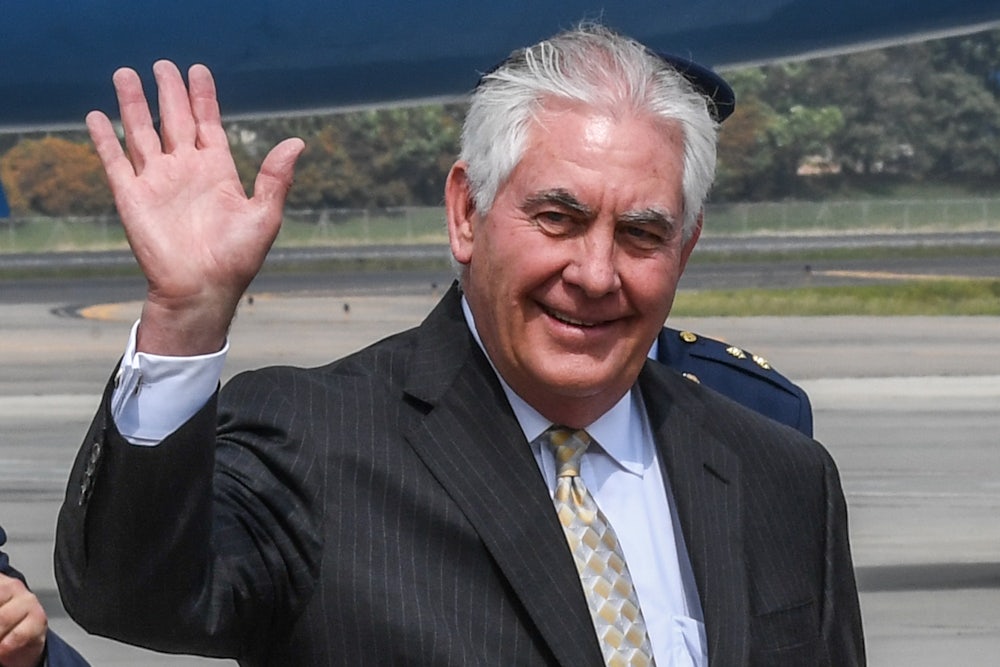Secretary of State Rex Tillerson may have known his time in the Trump administration was coming to an end, but he didn’t know when that would be until Tuesday morning, when his boss announced his replacement on Twitter.
Mike Pompeo, Director of the CIA, will become our new Secretary of State. He will do a fantastic job! Thank you to Rex Tillerson for his service! Gina Haspel will become the new Director of the CIA, and the first woman so chosen. Congratulations to all!
— Donald J. Trump (@realDonaldTrump) March 13, 2018
While “White House officials said that Tillerson had been informed of the decision Friday,” the Associated Press reported, “Undersecretary of State Steve Goldstein and other State Department officials said that Tillerson hadn’t learned he was dismissed until he saw Trump’s early-morning tweet, and hadn’t discussed it directly with the president.” Goldstein, who said Tillerson was “unaware of the reason” for being fired and “had had every intention of staying,” himself was fired for contradicting the White House’s version of events.
Tillerson, a former CEO of Exxon Mobil, has very few supporters either among Democrats or Republicans. His tenure as secretary of state has been widely described as chaotic, even by the standards of the Trump administration. CIA Director Mike Pompeo, if he’s confirmed by the Senate, might prove to be a more effective administrator because of his legislative experience—he served in the U.S. House of Representatives for six years—and his tight bond with Trump. Be he’s likely to be a much more extreme policymaker.
Some on the left are declaring Tillerson among the worst secretaries of state, ever. New York Times columnist Paul Krugman derided him as “surely the worst Secretary of State since William Jennings Bryan.” Crooked Media’s Tommy Vietor, a former National Security Council spokesman under President Barack Obama, tweeted that “Tillerson was probably the worst Secretary of State in modern history. He gutted and demoralized the department and delivered nothing for this country.”
But Tillerson was far from the worst modern secretary of state in terms of the actual consequences of his actions. Nothing in his short tenure matches the horrors inflicted on the world by predecessors such as Dean Rusk (the Vietnam War), Henry Kissinger (the secret bombing of Cambodia, the support for the coup in Chile) or Colin Powell (the Iraq war).
In purely policy terms, Tillerson was a moderating force in the Trump White House, pushing Trump to stay in the Paris climate agreement, uphold the Iran nuclear deal, condemn Russian interference in the 2016 election, and engage in diplomacy with North Korea. On all these issues, Pompeo will be much more hawkish and closer to Trump.
Tillerson was a terrible secretary of state because he was ineffective. He never earned Trump’s trust, blunting his ability to guide policy. Further, Tillerson’s ill-conceived reform of the State Department has caused lasting damage. “His proposed redesign of the State Department was botched, and botched badly,” Washington Post columnist Daniel Drezner writes. “His incompetent management of Foggy Bottom helped trigger an exodus of seasoned Foreign Service officers and crushed morale among the remaining diplomats. It seemed as though he could not visit a region without saying something that offended his hosts.”
Writing in the The New York Times, Peter Baker and Gardiner Harris provided damaging examples of Tillerson’s “poor oversight of the State Department”:
He approved one global conclave in Washington just eight days before the event was to start, ensuring that few leaders from around the world were able to attend. He rarely sat for comprehensive briefings with many of his top diplomats and often failed to consult the State Department’s experts on countries before visiting.
Foreign diplomats — starting with the British and the French — said Mr. Tillerson neither returned phone calls nor, with much advance warning, set up meetings with his counterparts. Strategic dialogues with many nations, including nuclear weapons powers like Pakistan, were ended without explanation.
According to Politico, Tillerson’s firing has “sent a wave of hope through a department battered by low morale under Tillerson, who dismissed the expertise of career diplomats and sought to downsize the department.”
Elizabeth Saunders, a political scientist at George Washington University, is cautiously hopeful that Pompeo can succeed where Tillerson failed. Pompeo “is apparently well-liked at the CIA and seems to have drawn on his ‘building’ in a way that Tillerson never did at State,” she wrote in the Post. “That emphasis on professionalization, if it carries over, would probably be a welcome shift within the State Department.” The position is also “fundamentally a political role.” As a close confidant of Trump, Pompeo might be a better advocate for his department and avoid messaging conflicts with the White House.
“Pompeo will have the president’s trust but enable his worst foreign policy instincts,” one diplomat told The Daily Beast. “Sanity has never been the guiding principle of this White House.”
The question of Tillerson versus Pompeo comes down to whether it is better to be incompetent and have the right policies (as Tillerson does) or be competent but with more dangerous policies. Yet the fate of American foreign policy rests not with Pompeo, but his boss. The firing of Tillerson is the latest sign that Trump is taking a more hands-on approach to his presidency, after his surprise announcements on steel and aluminum tariffs and agreeing to meet with North Korean dictator Kim Jong Un.
Trump has become unchained. Times reporter Maggie Haberman offers this theory:
The narrative of Trump unglued is not totally wrong but misses the reason why - he was terrified of the job the first six months, and now feels like he has a command of it.
— Maggie Haberman (@maggieNYT) March 13, 2018
As Trump takes charge of his own foreign policy, those on the left who are celebrating Tillerson’s firing may soon miss the most ineffective secretary of state that America has ever had.
